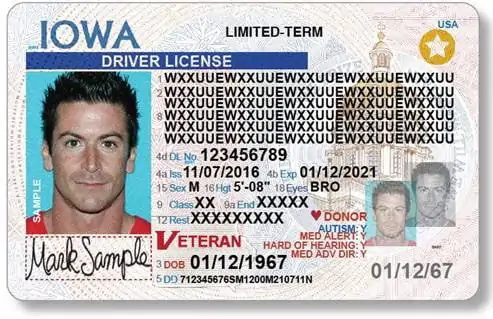Iowa
ID Scanning Laws
At the outset, it is important to note that in Indiana, a retailer is allowed to retain and use information obtained from IDs only for the following purposes:
- Verifying a customer’s age
- Establishing a customer’s identity
- Confirming a customer’s license status to operate a vehicle
- Disclosing such information to another business for:
- Verifying a check payment
- Evaluating creditworthiness
- Detecting or reducing the risk of fraud, abuse, identity theft or other crimes
- Collection activities
- Confirming that a customer has met the motor vehicle financial responsibility requirements
- Disclosing such information to:
- The department of transportation
- Insurance licensees
- Notaries
- Financial institutions if permitted by federal law
- Law enforcement agencies




Iowa State Legislature
ID Scanning Resources
The Legal Framework
Iowa ID Scanning Laws and Regulations
In the hospitality industry, verifying the identity of guests is a crucial aspect of operations. This process often involves scanning identification (ID) documents, such as driver’s licenses or passports. However, the laws and regulations surrounding ID scanning vary from state to state, and it’s essential for hotels to understand and comply with these rules to avoid legal complications.
In Iowa, there are no specific laws that regulate a business’s practice of scanning IDs or retaining information obtained from a scan. Therefore, it’s likely that a hotel in Iowa is allowed to scan IDs and retain the information obtained, subject to applicable privacy laws. However, the information obtained from IDs can only be used for specific purposes:
- Verifying a customer’s age
- Establishing a customer’s identity
- Confirming a customer’s license status to operate a vehicle
- Disclosing such information to another business for:
- Verifying a check payment
- Evaluating creditworthiness
- Detecting or reducing the risk of fraud, abuse, identity theft, or other crimes
- Collection activities
- Confirming that a customer has met the motor vehicle financial responsibility requirements
- Disclosing such information to:
- The department of transportation
- Insurance licensees
- Notaries
- Financial institutions (if permitted by federal law)
- Law enforcement agencies
The following sections will delve deeper into the relevant statutes and bills that may impact the practice of ID scanning in Iowa hotels.
Iowa Code 2016: Alcoholic Beverage Control
According to Iowa Code 2016, Section 123.48, a liquor control licensee or wine or beer permittee, or an employee of the licensee or permittee, may retain a driver’s license or non-operator identification card if they have a reasonable belief, based on factual evidence, that the ID is altered, falsified, or belongs to another person. This is particularly relevant for hotels that sell alcoholic beverages.
The licensee or permittee must deliver the retained ID to the appropriate city or county law enforcement agency within 24 hours and file a written report of the circumstances under which the card was retained. The licensee, permittee, or employee is not subject to criminal prosecution or civil liability for retaining and delivering an ID under these circumstances.
Iowa Senate Study Bill 1128: Regulation of Certain Tobacco Products
Iowa Senate Study Bill 1128 relates to the regulation of certain tobacco products and provides penalties. It stipulates that all tobacco devices delivered by delivery sale directly to a resident of the state must be sold only by a device delivery sale permit holder. Deliveries can only be made to persons 21 years or older. Upon delivery, the permit holder must obtain proof of age, and records must be maintained.
Failure to follow regulations outlined in this bill result in monetary fines ranging from $500 and $1000 for the first and second offenses. The third offense results in suspension or revocation of license.
Iowa Senate Bill 262: Consumer Data Protection
Iowa Senate Bill 262 relates to consumer data protection and provides civil penalties. Businesses can authenticate an ID through reasonable means. A consumer is then entitled to exercise their consumer rights in section 715D.3. Personal data collected, used, or retained pursuant to this section shall, where applicable, take into account the nature and purpose or purposes of such collection, use, or retention. Such data shall be subject to reasonable administrative, technical, and physical measures to protect the confidentiality, integrity, and accessibility of the personal data.
Penalties for violating provisions in this chapter are dealt by the attorney general. Penalties are determined by the number of violations and range from a written notice to $7500 per violation.
Please note that this information is intended to provide a general overview and does not constitute legal advice. Always consult with a legal professional for advice specific to your situation
Iowa Anti-Trafficking Network
Our Fight Against Human Trafficking



Knowledge Base
Frequently Asked Questions
Yes, in the absence of any specific statute governing ID scanning, a hotel in Iowa can scan a guest's ID and retain the information obtained, subject to applicable privacy laws.
A hotel can use the information for verifying a guest's age, establishing their identity, confirming their license status to operate a vehicle, and disclosing the information to other businesses or agencies for specific purposes.
Yes, according to Iowa Code 2016, Section 123.48, a hotel can retain a guest's ID if they have a reasonable belief that it's altered, falsified, or belongs to another person.
Penalties range from monetary fines to suspension or revocation of license for non-compliance with the regulations outlined in Iowa Senate Study Bill 1128. For Iowa Senate Bill 262, penalties range from a written notice to $7500 per violation.
The hotel should implement reasonable administrative, technical, and physical measures, as stipulated in Iowa Senate Bill 262.
Yes, a hotel can disclose such information to law enforcement agencies, among others, for specific purposes.
